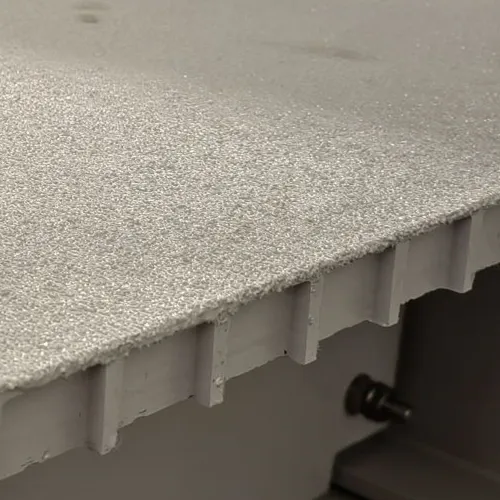loading...
- No. 9, Xingyuan South Street, Dongwaihuan Road, Zaoqiang County, Hengshui, Hebei, China
- admin@zjcomposites.com
- +86 15097380338
- Welcome to visit our website!
Exploring the Properties and Applications of FRP Rectangular Tubes in Structural Design
Understanding FRP Rectangular Tubes Applications and Benefits
Fiber Reinforced Plastic (FRP) has revolutionized many sectors with its exceptional strength-to-weight ratio, corrosion resistance, and versatility. Among the various shapes available in FRP materials, rectangular tubes are increasingly gaining popularity across different industries. This article delves into the characteristics, applications, and advantages of FRP rectangular tubes.
What is FRP?
FRP consists of a polymer matrix reinforced with fibers, usually glass, carbon, or aramid. This composite material combines the benefits of the fibers, which provide strength and stiffness, with the plastic matrix that offers durability and resistance to environmental factors. The flexibility in the choice of resin and fibers allows for tailored properties suited to specific applications.
Characteristics of FRP Rectangular Tubes
FRP rectangular tubes are manufactured through processes such as pultrusion, winding, or molding. The resulting tubes exhibit a combination of unique properties
1. Lightweight FRP tubes weigh significantly less than traditional materials like steel or aluminum. This reduces transportation costs and eases handling during installation. 2. High Strength Despite their lightweight nature, FRP rectangular tubes possess remarkable tensile and compressive strength. They can withstand structural loads effectively, making them ideal for various applications.
3. Corrosion Resistance One of the standout features of FRP is its ability to resist corrosion from chemicals, water, and environmental factors. This durability extends the lifespan of structures significantly, reducing the need for frequent replacements.
4. Thermal and Electrical Insulation FRP is a poor conductor of heat and electricity, offering thermal insulation and electrical safety in many applications.
Applications of FRP Rectangular Tubes
The versatility of FRP rectangular tubes allows for their utilization in a wide range of sectors
frp rectangular tube

1. Construction In the construction industry, FRP rectangular tubes serve as structural components, providing support in bridges, buildings, and other infrastructure projects. Their resistant nature to corrosive environments makes them ideal for use in marine and coastal structures.
2. Transportation In the automotive and aerospace industries, FRP tubes are used in designing lightweight and fuel-efficient vehicles. Their high-performance attributes contribute to a reduction in overall weight without compromising on strength or safety.
3. Electrical Industry FRP rectangular tubes are beneficial for electrical applications, where non-conductive properties are essential. They are often utilized for cable trays, conduits, and supports to ensure safety and reliability.
4. Piping Systems Due to their resistance to chemicals and corrosion, FRP rectangular tubes are extensively used for piping systems in chemical processing, wastewater management, and other industrial applications.
5. Sports and Recreation In sporting goods, FRP rectangular tubes are utilized in the manufacturing of lightweight equipment such as bicycles and sports frames, enhancing performance and durability.
Advantages Over Traditional Materials
FRP rectangular tubes provide numerous advantages over traditional materials such as metal or wood
1. Cost-effectiveness While the initial investment may be higher, the long-term savings associated with maintenance, replacement, and durability make FRP a cost-effective choice.
2. Environmental Resistance Unlike wood, which can rot or warp, or metals that can corrode, FRP provides a robust alternative that can withstand harsh environmental conditions without deteriorating.
3. Sustainability Many manufacturers are adopting eco-friendly practices in producing FRP materials, contributing to sustainable development. Furthermore, FRP is recyclable, adding to its appeal as an environmentally responsible option.
Conclusion
FRP rectangular tubes stand at the forefront of modern material science, offering a combination of lightweight, strength, and durability. Their diverse applications across various industries underscore their growing significance as a solution to contemporary engineering challenges. As technologies advance and new materials are developed, the use of FRP tubes will likely expand further, providing innovative solutions for both current and future needs.
-
Transform Your Spaces with FRP Grating SolutionsNewsNov.04,2024
-
The Versatility and Strength of FRP RodsNewsNov.04,2024
-
The Excellence of Fiberglass Water TanksNewsNov.04,2024
-
The Benefits of FRP Grating for Your ProjectsNewsNov.04,2024
-
Elevate Your Efficiency with FRP Pressure VesselsNewsNov.04,2024
-
Welcome to the World of FRP Pressure VesselsNewsOct.12,2024
-
Unveiling the Future of Filtration: Why FRP Filter Vessels are a Game ChangerNewsOct.12,2024
